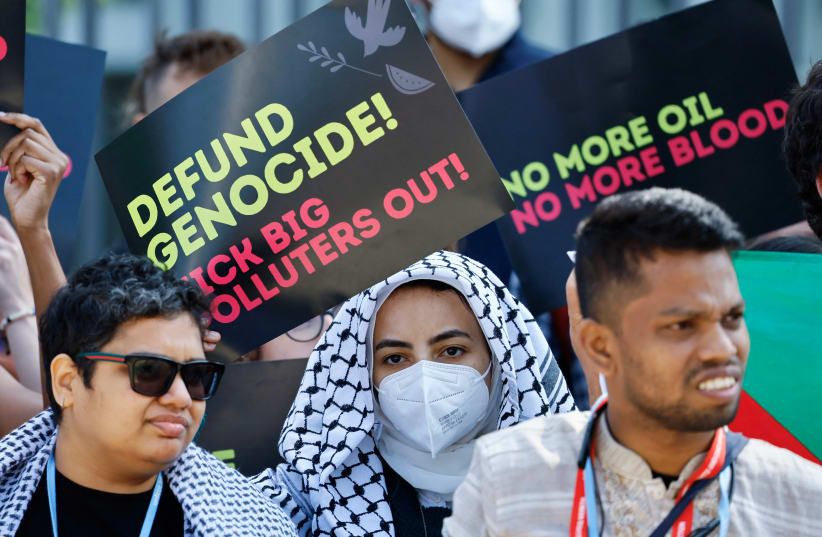Germany’s Federal Office for the Protection of the Constitution, the state’s federal domestic intelligence agency, in a new report issued by Germany’s Federal Interior Minister Nancy Faeser on Tuesday reported that it was treating the Boycott, Divestment, and Sanctions (BDS) movement as a “suspected extremist case.”
The report noted that the movement had “links to secular Palestinian extremism.” It also stated that there were “sufficiently strong factual indications” that the BDS “violates the idea of international understanding,” German news site Watson also stated.
The report claimed that the BDS is now being regarded as a suspected extremist movement. It also noted that the BDS is not a homogeneous association, party, or organization.
Further, the ministry’s report gave some background on the BDS movement, which was founded in 2005, clarifying that it was supported by over 170 Palestinian organizations, including several nongovernmental ones, as well as Palestinian terrorist groups Hamas and the Palestinian Islamic Jihad (PIJ), which were responsible for the October 7 massacre.
Moreover, the report stipulated that “there is sufficient, strong, factual evidence to suggest that [the] BDS thereby violates, among other things, the idea of international understanding” by undermining and questioning Israel’s right to exist.
Der Verfassungsschutz hat die BDS-Bewegung erstmals als extremistischen Verdachtsfall eingestuft. »Mit der Verharmlosung von oder gar dem Sympathisieren einiger Kultureinrichtungen mit BDS muss endlich Schluss sein!«, fordert DIG-Präsident Volker Beck. https://t.co/LyitMnN2bs
— Jüdische Allgemeine (@JuedischeOnline) June 18, 2024
Additionally, the report referred to the October 7 massacre, stating, “After the terrorist attacks by Hamas on Israel on October 7, 2023, BDS-affiliated groups mobilized and participated in many anti-Israel gatherings and intensified their demands for an end to an alleged ‘Israeli apartheid’ as well as called for a boycott of companies and goods related to Israel.”
Initial responses and quotes by German minister Faeser
German news site Judische Allegemeine quoted Faeser as stating, “We must oppose internal threats from extremism just as decisively as [we do] external threats.”
“We absolutely have to break the spiral of escalations in the Middle East, leading to even more disgusting hatred of Jews here,” Faeser announced.
“Security authorities are reacting with great vigilance to the latest developments and are actively taking action against any kind of anti-Israel and antisemitic agitation,” she said.
Deutschlandfunk, a German public-broadcasting radio station covering current events and political affairs, also confirmed earlier reports that Germany’s federal domestic intelligence agency designated the BDS movement as an extremist one.
The German-Israeli Society (DIG) welcomed this classification for the BDS movement. Volker Beck, DIG’s president, released a statement commending the decision, stating, “For the first time, the Federal Office for the Protection of the Constitution names the anti-Israeli boycott movement BDS as a suspected extremist case in its annual report.”“This supports the assessment of the German Bundestag in its ‘confront the BDS-Movement Resolutely – Fighting Antisemitism’ resolution in 2019,” Beck added.
Beck continued, “All forms of antisemitism must be fought equally – consistently. The trivialization of or even sympathy by some cultural institutions with [the] BDS must finally stop.”
“We welcome the recent bans on associations issued by Federal Interior Minister Nancy Faeser, which weakened the infrastructure of significant extremist-antisemitic organizations. We call for this course to be consistently continued,” Beck said in her concluding DIG statement.
Olga Deutsch, Vice President of NGO Monitor, said: “This is an additional important decision taken by the German government following the October 7th atrocities, which acknowledges the direct link between NGO-led discriminatory campaigns against Israel (culturally, economically, and reputationally) and the Palestinian terror."
"These campaigns seek to whitewash terror and erode Israel's legitimacy, and Germany just formalized the danger this poses on its own soil.”
